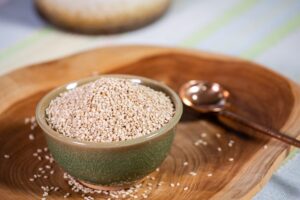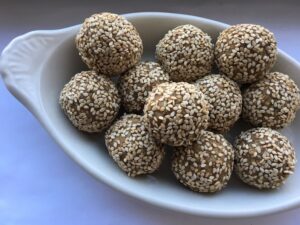When it comes to healthy fats, sesame seeds often go unnoticed. These tiny seeds are nutritional powerhouses, packed with beneficial fats that can boost your overall health. Let’s delve into the world of sesame seeds and discover why they deserve a permanent spot in your pantry.

Nutritional Profile of Sesame Seeds
Despite their small size, sesame seeds offer a remarkable array of nutrients. Here’s a breakdown of the nutrition in just one tablespoon (approximately 9 grams) of sesame seeds:
Calories: 52
Protein: 1.6 grams
Fat: 4.5 grams
- Saturated Fat:6 grams
- Monounsaturated Fat:8 grams
- Polyunsaturated Fat:0 grams
Fiber: 1.1 grams
Calcium: 88 milligrams
Iron: 1.3 milligrams
Magnesium: 32 milligrams
Zinc: 0.7 milligrams
Benefits of Healthy Fats in Sesame Seeds
Heart Health
Rich in monounsaturated and polyunsaturated fats, sesame seeds support heart health by lowering bad cholesterol (LDL) and increasing good cholesterol (HDL). This balance helps reduce the risk of heart disease.
Anti-Inflammatory Properties
The omega-6 fatty acids in sesame seeds have powerful anti-inflammatory properties, which can help decrease inflammation and lower the risk of chronic conditions such as arthritis.
Skin and Hair Health
Healthy fats in sesame seeds are beneficial for maintaining skin hydration and improving elasticity. Additionally, the zinc and other nutrients contribute to strong, healthy hair.
Bone Health
Sesame seeds are an excellent source of calcium and magnesium, essential minerals for bone health. The presence of healthy fats enhances the absorption of these minerals, supporting strong bones.
How to Incorporate Sesame Seeds into Your Diet
Adding sesame seeds to your diet is easy and delicious. Here are some ideas:
- Sprinkle on Salads:Add a tablespoon of sesame seeds to your Nigerian salads for a nutty crunch. They pair well with tomatoes, onions, cucumbers, and avocados.
- Smoothies:Blend sesame seeds into your smoothies for an extra nutritional boost. They complement a mix of mango, banana, and spinach.
- Baking:Incorporate sesame seeds into bread, puff-puff, or chin-chin recipes for added crunch and flavor.
- Sesame Oil:Use sesame oil in cooking for a rich, nutty flavor. It’s perfect for stir-fries, soups, and dressings, and can be drizzled over roasted yams or plantains.
- Sesame Soup:Add ground sesame seeds to soups for added thickness and flavor, enhancing traditional Nigerian soups.
Recipe to Try: Sesame Seed Energy Balls

Ingredients:
- 1 cup dates, pitted
- 1/2 cup sesame seeds
- 1/4 cup groundnut paste (peanut butter)
- 1/4 cup shredded coconut
- 1 tablespoon chia seeds
- 1 teaspoon vanilla extract
Instructions:
- In a food processor, blend the dates into a paste.
- Add the groundnut paste, shredded coconut, chia seeds, and vanilla extract. Blend until well combined.
- Roll the mixture into small balls.
- Roll each ball in sesame seeds until fully coated.
- Refrigerate for at least 30 minutes before serving.
These energy balls are a perfect snack, the recipe for Sesame Seed Energy Balls typically makes about 12-15 servings, depending on the size of the balls you roll. If you make smaller balls, you might get closer to 14 servings, whereas larger balls would yield around 12 servings. providing a boost of healthy fats and energy to keep you going throughout the day.
Sesame seeds may be small, but their nutritional benefits are immense. By incorporating these seeds into your diet, you can enjoy a range of health benefits, including improved heart, skin, hair, and bone health. Start experimenting with sesame seeds today and experience the power of this nutritional powerhouse.
